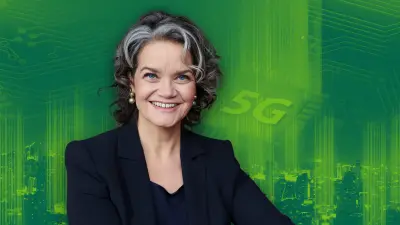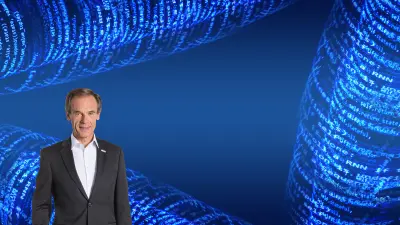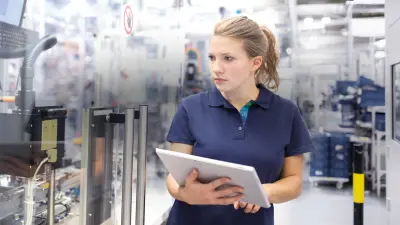The digital future of daily life
In dialogue with the Member of Deutsche Telekom’s Board of Management

2021-06-04
Claudia Nemat from Deutsche Telekom’s Board of Management explains why the COVID-19 pandemic has expedited the digital transformation process and how 5G will improve networks.
When the coronavirus pandemic first began in March 2020, millions of employees had to transition to working from home very quickly. Data traffic in Deutsche Telekom’s network increased dramatically: The number of video conferences shot up by about 300 percent, and as a result of the Corona restrictions, the number of video stream parties, where users stream series and chat about them in groups at the same time, also spiked by nearly 3,000 percent. How did the data network handle this onslaught of demand? “It was the result of past investments in infrastructure modernization, in particular the digital transformation of the networks,” says Claudia Nemat.
She is a Member of Deutsche Telekom’s Board of Management, responsible for the Technology and Innovation division. However, Nemat also believes that another reason the transition to working from home went so smoothly in many places was that numerous companies had already introduced flexible models of work for their employees years before the pandemic began. Deutsche Telekom alone sent 16,000 of its employees home to work. But along with its partners, the company still helped to develop Germany’s Corona Warn app. “We managed to do that entirely virtually. The teams working on that have never actually met in person — and it worked nevertheless,” Nemat says.
By 3,000 percent
the number of video stream parties on the Deutsche Telekom network increased during the first Corona restrictions in Germany in spring of 2020.
5G expedites Industry 4.0
For Claudia Nemat, the pandemic has demonstrated the importance of reliable Internet connections for so many areas of our lives. “Public appreciation of resilient infrastructure has grown dramatically,” she says. “Our networks have been stable and secure in spite of major stresses.” The expansion of the 5G mobile communication standard is now the next step in the digital transformation process, she adds. “Our fast-growing 5G network brings high-speed connectivity to over 80 percent of the German population. And for businesses, 5G offers new opportunities for the Internet of Things and Industry 4.0,” Nemat says.
For commercial customers, Deutsche Telekom is already installing “campus networks”: exclusive 5G mobile communications networks restricted to a defined location. In the industrial sector, these networks allow for the use of self-driving shuttles to transport material, for instance. This is possible because the increased network speed of 5G reduces response times, facilitating real-time communication between devices. In the healthcare sector, Deutsche Telekom is equipping entire hospitals with 5G networks, allowing the wards to exchange enormous volumes of data such as CT scans.
Faster gaming with 5G
Users will also benefit from 5G in their private lives. Claudia Nemat expects that the number of conventional smart devices with integrated AI will increase thanks to 5G. And consumer electronics will benefit from the higher data rate: “Due to the very good latency, we will experience an even stronger merging of the digital with the physical reality,” Nemat says. Latency describes the period of time it takes for a data packet to travel from a sender to a recipient, for example, the exchange of data between a smartphone and a server.
The latency in 4G networks is between 60 and 98 milliseconds, while in a 5G network it is only 1 to 10 milliseconds. Transmitting the contents of a DVD (4.5 gigabytes) takes 1 minute and 13 seconds in a 4G network, but with 5G, the data can be transferred within just 3.7 seconds. That’s why cloud and mobile gaming in a 5G network is much smoother. “When you are playing with your avatar, it will feel astonishingly real. So, we will see more augmented and virtual reality formats,” Nemat says.
“We will see a mass democratization of services that have, in the past, only been available to a privileged few.”
Companies cooperate on smart homes
Digitalization will make our work and home lives much more convenient within the next ten years. Claudia Nemat explains: “I believe we will see a mass democratization of services that have, in the past, only been available to a privileged few. This includes robots, kitchen robots, and a proliferation of other low-cost devices that can support us.” She compares the approaching digital transformation with the advent of washing machines and dishwashers in private households, which made life easier for many people. In the future, our own homes will progressively become smart homes, where intelligent devices from different manufacturers seamlessly communicate with one another.
Consequently, cooperation between smart product manufacturers will play an increasingly important role. Bosch and other partners are already cooperating as part of the Home Connect Plus network. Via the platform of the same name, people with smart homes can control various smart devices and services in their home centrally by using one app, rather than needing multiple apps for different devices.
EU cloud for greater data sovereignty
Our daily lives are growing increasingly networked, so data security and privacy protection are becoming more and more important. Users have to contribute here by using secure passwords and installing software updates regularly, Claudia Nemat explains. And companies are responsible for tailoring networked products to people and their needs. Nemat refers to the users’ data sovereignty in this context: “Data sovereignty means that as a person, as an institution, or as a company, I can decide with whom I want to share my data, for what purpose, and for how long.” That’s why Nemat supports initiatives like GAIA-X.
The objective of the project — which also counts Deutsche Telekom and Bosch among its members — is to establish a European cloud infrastructure that protects its data streams in accordance with the European General Data Protection Regulation. Additionally, Deutsche Telekom was one of the world’s first companies to lay out ethics guidelines for working with AI; it did so in 2018. “An AI system should never be a black box. In the end, there always needs to be a human group that is responsible for whatever the outcome is,” Claudia Nemat explains.
The network is going green
In addition to data protection, environmental responsibility is a major focus at Deutsche Telekom. “We see that our industry is a significant contributor to CO₂ emissions. This is why we have decided to put ourselves on a path to carbon neutrality,” Claudia Nemat says. The company has been acquiring its electricity from 100 percent renewable sources since last year. Deutsche Telekom plans to use green energy exclusively at all its locations around the world by the end of this year.
The company’s sustainability strategy relies on electric vehicles, solar power systems, and eco-friendly products. Deutsche Telekom is also involving its suppliers, laying out precise sustainability guidelines for them to follow. “I think that every company should make a major contribution to sustainability issues,” Nemat says.
Watch the webinar with Claudia Nemat as part of BCW.on 2021: The digital future is now — let’s shape it
Profile

Claudia Nemat, 52
Member of Deutsche Telekom’s Board of Management, responsible for the Technology and Innovation division
Future technologies have to be sustainable, secure and open.
Claudia Nemat studied physics, going on to become a lecturer at the Institute for Mathematics and Theoretical Physics at the University of Cologne in Germany. Before she came to Deutsche Telekom, she worked at consulting firm McKinsey & Company for 17 years, where she held a range of different positions, including co-director of the global technology sector. She has been a Member of the Board of Management at Deutsche Telekom since 2011, and she was responsible for the company’s European operations until the end of 2016. Since then, she has headed its Technology and Innovation division. Her primary areas of focus include digital transformation, the impact of new technologies on our working and home lives, product innovation, and security and crisis management.
Summary:
Digital transformation continues to advance with the expansion of the 5G network. According to Claudia Nemat, the next ten years will see a mass democratization of services that have only been available to a privileged few in the past. At the same time, data security and sustainability will increasingly come into focus.


